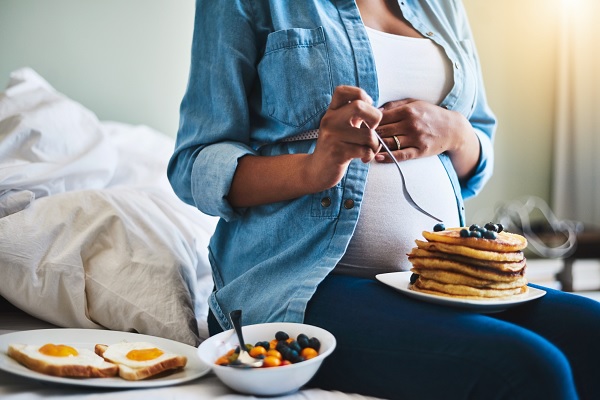The Mirror's Health , Lifestyle and Fashion

Maintaining a healthy pregnancy
The 40 (or so) weeks of pregnancy are indeed an unforgettable experience. Keeping a healthy lifestyle throughout pregnancy is imperative for both baby and mother. This article talks about important steps to a healthy pregnancy, and everything in-between.
Advertisement
When a woman finds out she’s pregnant, one immediate question that probably comes to her mind is: “so, what do I eat?” As already known, a woman’s body goes through many physical and hormonal changes during pregnancy, and taking care of herself has never been more important.
To fuel herself and her growing baby, she’ll have to make significant food choices from a variety of sources. The good thing? Such nutritional guidelines aren’t that hard to learn and follow. Let’s have a look at them…
Increased nutrients and calories
No surprise here: during pregnancy, your body requires increased nutrition – you’re feeding a whole new person! Although the adage of “eating for two” isn’t completely true, you do need more micronutrients and macronutrients to support you and your baby.
Macronutrients are nutrients that provide calories, or energy. These are carbohydrates, proteins and fats. Regarding calories, the current recommendation is to continue to eat as you normally would in your first semester, then adding additional calories daily in your second and third trimesters.
This could mean including a slice or two of whole-wheat bread with groundnut paste during breakfast, plus a medium-sized apple as a snack, and adding extra spoonfuls of rice and veggies during lunch or supper…and not necessarily doubling your normal food quantities.
Your goal is to eat a wide variety of healthy foods, including:
• Complex carbohydrates – e.g. whole grains, tubers, plantain, fruits and vegetables.
• Protein – e.g. lean meat, fish, eggs, low-fat milk and yoghurt, beans, lentils, peas and nuts.
• Healthful fats: from foods such as oily fish, avocados, nuts, seeds and vegetable oils e.g. olive oil.
Micronutrients include vitamins and minerals, and they’re only required in relatively smaller amounts. Key micronutrients for a healthy pregnancy include:
Folic acid/folate
This nutrient is particularly important because it reduces the risk of neural tube defects in babies. Good food sources include green leafy vegetables, whole grains, beans, nuts and eggs.

Wash fruits and vegetables well before consumption
Iron
Iron is a crucial element in many of the body’s processes. Iron-rich foods include meat, fish, leafy greens and beans. Iron is poorly absorbed from plant foods, so it’s essential to eat them with vitamin C-rich foods to increase its absorption.
To maximise absorption also, calcium-rich foods shouldn’t be eaten with iron-rich meals. You should also wait at least 2 hours after having calcium-rich foods before taking iron supplements.
Calcium
During pregnancy, calcium is needed for the healthy development of a baby's teeth, bones, heart, nerves and muscles. Good sources of calcium are milk and dairy products, seafood, beans and leafy vegetables.
B-vitamins
These are involved in many of the body’s regulatory and metabolic activities and are important in foetal growth and development. Sources include protein foods, whole grains, beans, nuts and green vegetables.
As it’s often difficult to obtain sufficient amounts of the aforesaid micronutrients and others from your diet alone, your doctor or dietician may recommend a prenatal supplement to help ensure that you get enough of such nutrients. And it’s important to stay within the daily dosage prescribed.
Foods to avoid
Truth be told, among the first things women learn when they’re pregnant is what they can’t eat. Thankfully, there’s more you can eat than what you can’t. Nonetheless, certain foods should only be consumed rarely, while others must be avoided entirely:
Undercooked or raw meat, fish and eggs
Eating uncooked or raw meat, fish and eggs increases your risk of several infections, be it viral, bacterial or parasitic. Some of these infections may only affect you, causing fever, vomiting, diarrhoea, stomach cramps and weakness.
Other infections may be passed on to your little one with possibly serious, or even fatal health consequences. Taking no chances, pregnant women should cook meat, fish and eggs thoroughly before consumption.
Organ meat
Offals are a great source of a variety of nutrients - vitamin B12, vitamin A, zinc etc. – all of which are good for you and baby. However, eating too much animal-based vitamin A isn’t advisable during pregnancy as it could cause congenital malformations and miscarriage. So it’s best to limit their intake.
Caffeine
Pregnant people are generally advised to reduce their caffeine intake, which is found in foods such as coffee, as well as carbonated and energy drinks.
Caffeine can pass easily into the placenta and because babies don’t have the enzyme needed to metabolise caffeine, high levels can build up. This can consequently lead to slow foetal growth.
Unwashed produce
Contamination can occur at any time – during production, harvest, processing, storage, transportation or retail. The surfaces of unwashed or unpeeled produce e.g. fruits and vegetables may be contaminated with several bacteria and parasites.
While you’re pregnant, please observe safe food practices to minimise your risk of infections and food poisoning.
To be continued…
The writer is a registered dietician
and a member of the Ghana Dietetic Association
[email protected]




